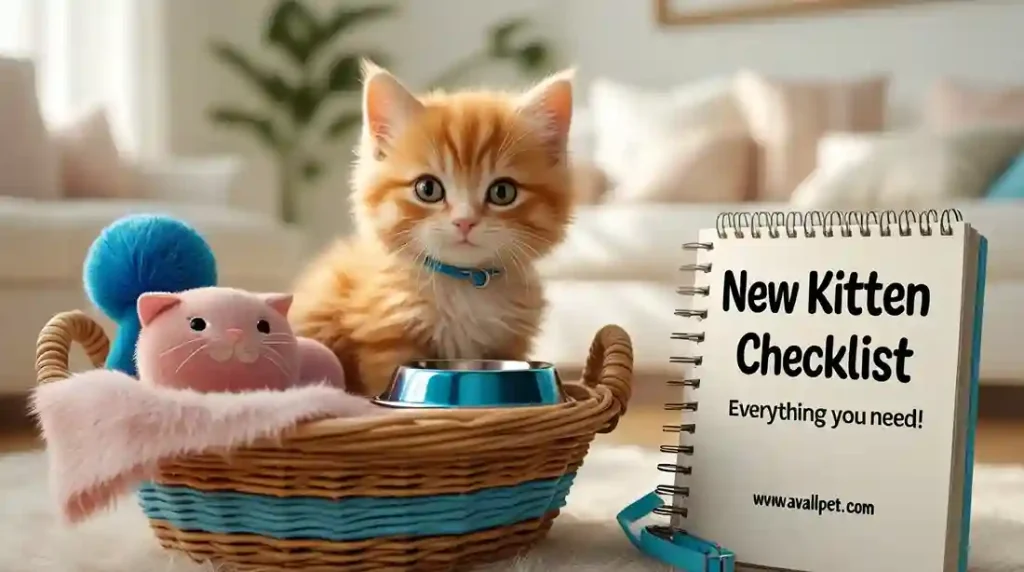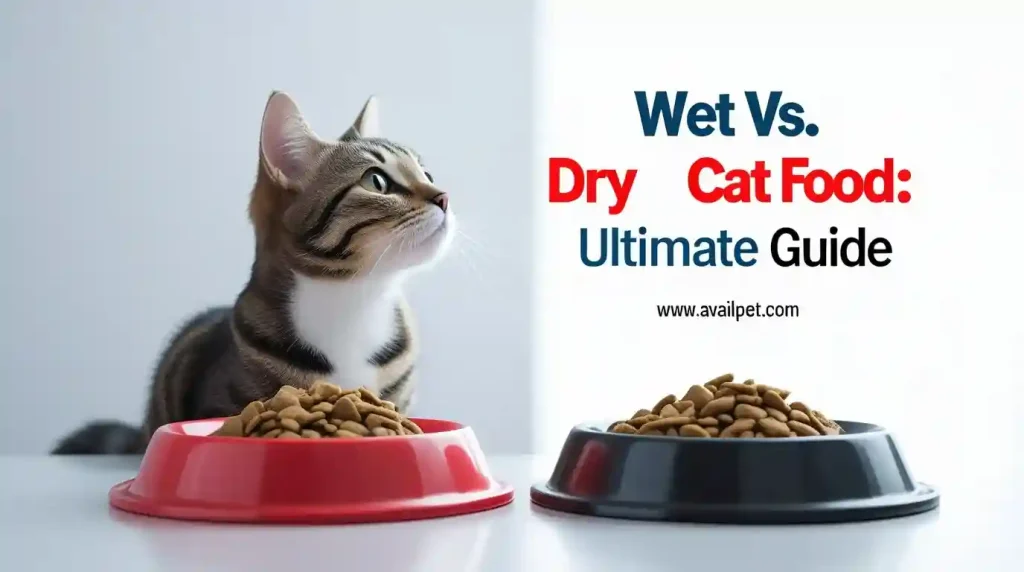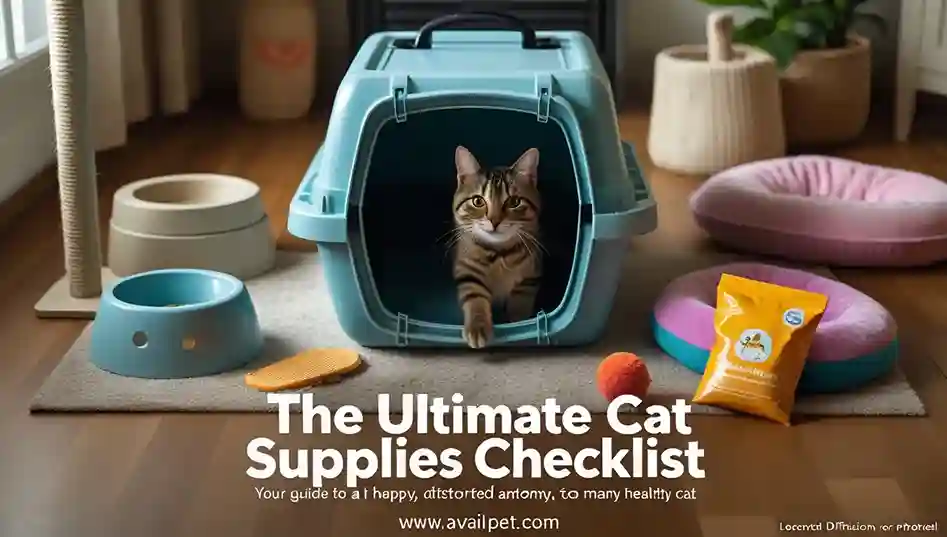Watching your faithful companion age is a journey of love, but it comes with new challenges. If you’ve noticed your senior cat hesitating before entering the litter box, scratching at the sides in frustration, or, most distressingly, starting to have accidents outside of it, your heart sinks. It’s easy to assume it’s a behavioral issue, but the truth is often far more simple and solvable: their litter box has become a source of pain and discomfort. For a full understanding of feline bathroom habits, see our Complete Cat Litter Guide.
The hard, dusty litter they used for years can now hurt their arthritic paws. The high sides of the box are a barrier their stiff joints can no longer easily cross. Their aging senses and health conditions demand a cleaner, gentler environment.
At AvailPet, we believe your cat’s golden years should be comfortable and dignified. This definitive guide to the best cat litter for senior cats is built on veterinary insight and specialized testing. We’ve identified litters that prioritize softness for aching paws, low dust for sensitive lungs, and ease of use for both your cat and you, helping you transform the litter box from a challenge back into a simple, pain-free part of their routine.
Key Takeaways: Cat Litter for Senior Cats
Before we dive into our detailed reviews, here are the most important insights from our veterinary consultation and senior-specific testing:
- 🏆 Best Overall for Sensitive Paws: Dr. Elsey’s Senior Litter is specifically formulated with extra-soft, fine granules to provide cushioning for arthritic joints and sensitive paws.
- ♿ Top Pick for Arthritic Cats: PrettyLitter stands out for its ultra-lightweight, sand-like crystals that require minimal digging effort, making it the easiest litter for stiff, painful joints to navigate.
- 🌫️ Best for Respiratory Health: World’s Best Cat Litter uses a natural, whole-kernel corn formula that produces near-zero dust, protecting your senior cat’s aging and potentially compromised respiratory system.
- 💪 Easiest Cleanup for Caregivers: Arm & Hammer Clump & Seal Slide features a non-stick formula that prevents waste from adhering to the box, making daily scooping effortless and ensuring a consistently clean environment.
- 🩺 Vet’s Critical Note: Studies show over 60% of cats over age 8 develop arthritis. Providing a soft litter and a low-entry litter box is not a luxury, but a medical necessity for their comfort and continued litter box use.
Quick Comparison Table: Senior Cat Litters at a Glance
This table provides a snapshot of our top-rated, vet-approved litters for senior cats. For in-depth reviews and health insights, jump to the detailed reviews section.
| Product | Material | Key Senior Benefit | Dust Level | Softness | Check Price |
|---|---|---|---|---|---|
| Dr. Elsey’s Senior Litter | Clay | Extra-Soft Pads | Low | Very Soft | Check Amazon |
| PrettyLitter | Silica Gel | Zero Digging Required | Dust-Free | Medium | Check Amazon |
| World’s Best Cat Litter | Corn | Natural & Breathable | Very Low | Soft | Check Amazon |
| Arm & Hammer Slide | Clay | Effortless Scooping | Low | Medium | Check Amazon |
Why Senior Cats Struggle: The 4 Critical Health Factors
Understanding why your older cat is having trouble is the first step to finding the right solution. These age-related health changes directly impact their litter box habits and preferences.
1. Arthritis & Joint Pain: The Discomfort of Hard Surfaces
Over 60% of cats over age 8 show signs of arthritis. Hard, coarse litter can be painful to stand on, and the act of digging becomes a strain on stiff, aching joints. This is why a softer, finer-textured litter that requires minimal digging is crucial for their comfort.
2. Respiratory Sensitivity: The Increased Danger of Dust
An older cat’s respiratory system is more vulnerable. Dust from clay litter can irritate their lungs, exacerbating conditions like asthma or chronic bronchitis. Low-dust or dust-free litter is no longer just a preference—it’s a health priority for their aging lungs.
3. Kidney Disease & Increased Urination: The Need for Superior Absorption
Chronic Kidney Disease (CKD) is common in senior cats, leading to more frequent urination and larger urine volumes. A litter with poor absorbency will become saturated quickly, creating a wet, unpleasant box that can burn their paws and deter use. Effective moisture-wicking and odor control are essential.
4. Cognitive Decline & Sensory Changes: Confusion and Aversion
Aging can affect your cat’s mind and senses. They may become disoriented and forget the box’s location, or their heightened sense of smell may find a heavily perfumed litter overwhelming. An unscented litter in a consistent, easy-to-find location helps manage these challenges.
By addressing these specific health factors, you can choose a litter that actively supports your senior cat’s well-being rather than adding to their struggles.
Top 4 Senior Cat Litter Reviews
We tested dozens of litters with senior cats’ specific needs in mind. These four stood out for their exceptional performance in comfort, safety, and ease of use.
1. Dr. Elsey’s Senior Litter — Best Overall for Sensitive Paws
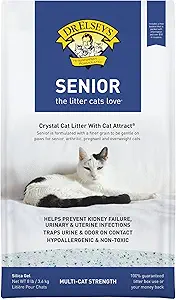
- Award: 🏆 Best Overall for Sensitive Paws
- Key Specs: Material: Clay | Clumps: Yes | Dust Level: Low | Scent: Unscented
Our In-Depth Analysis:
Dr. Elsey’s Senior Litter is specifically engineered for aging felines. Its ultra-soft, fine granules provide a cushioned surface that’s gentle on arthritic joints and sensitive paws, making standing and digging noticeably more comfortable. The low-dust, unscented formula respects their delicate respiratory systems and sense of smell, while still forming strong clumps for easy cleanup. It’s the complete package for overall senior comfort.
Pros:
- Exceptionally soft texture for painful paws.
- Low dust and unscented, making it a great choice for households that need the Best Low Dust Cat Litters.
- Forms reliable, easy-to-scoop clumps.
- Specifically designed with vet input.
Cons:
- Can be heavier than some alternatives.
- May track more due to fine granules.
2. PrettyLitter — Best for Arthritis & Health Monitoring
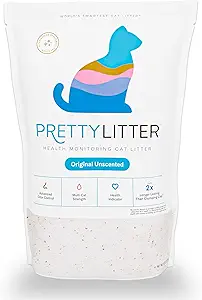
- Award: ♿ Best for Arthritis & Health Monitoring
- Key Specs: Material: Silica Gel | Clumps: No | Dust Level: Dust-Free | Scent: Unscented
Our In-Depth Analysis:
PrettyLitter serves a dual purpose for senior cat care. Its weightless, sand-like crystals require virtually no digging effort, making it the top choice for cats with severe arthritis or mobility issues. As a dust-free litter, it’s ideal for cats with asthma. Most notably, its color-changing technology can provide early warning signs of common senior health issues like urinary tract infections or kidney problems, offering invaluable peace of mind.
Pros:
- Ultra-lightweight and easy on joints.
- Completely dust-free.
- Provides early health alerts.
- Excellent urine odor control.
Cons:
- Premium subscription price.
- Doesn’t clump (solid waste only).
- Some cats dislike crystal texture.
3. World’s Best Cat Litter — Best Natural Choice
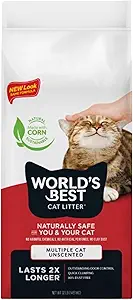
- Award: 🌿 Best Natural Choice
- Key Specs: Material: Corn | Clumps: Yes | Dust Level: Very Low | Scent: Unscented
Our In-Depth Analysis:
For owners seeking a natural solution that doesn’t compromise on comfort, World’s Best Cat Litter delivers. Made from whole-kernel corn, it offers a soft, sand-like texture that’s comfortable for sensitive paws while being naturally low in dust. It’s highly absorbent, making it suitable for cats with kidney disease who urinate frequently, and it controls odors effectively without chemicals. It’s also biodegradable and flushable.
Pros:
- Soft, natural corn material.
- Very low dust.
- Highly absorbent for frequent urination.
- Eco-friendly and flushable.
Cons:
- Higher price point than clay.
- Lightweight granules may track.
- Can develop odor if not changed regularly.
4. Arm & Hammer Clump & Seal Slide — Easiest Maintenance
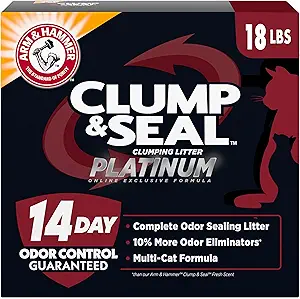
- Award: 💪 Easiest Maintenance
- Key Specs: Material: Clay | Clumps: Yes | Dust Level: Low | Scent: Lightly Scented
Our In-Depth Analysis:
This litter is a game-changer for caregivers. Its patented non-stick formula prevents waste from clinging to the box, making daily scooping effortless and ensuring a consistently clean environment for your cat. While it has a medium-soft texture, its true value lies in the ease of maintenance. The baking soda formula provides strong odor control, and low dust helps maintain air quality. The light scent may not be suitable for all sensitive cats.
Pros:
- Non-stick clumps make cleanup effortless.
- Excellent odor control with baking soda.
- Low dust formula.
- Affordable and widely available.
Cons:
- Contains a light scent.
- Texture may be too firm for severe arthritis.
- Not the softest option available.
Senior Cat Litter Buyer’s Guide: 5 Must-Consider Factors
Choosing the right litter for your senior cat means looking beyond basic clumping and odor control. Focus on these five essential factors to ensure their comfort and well-being.
1. Softness & Texture: Cushion for Aching Paws
Prioritize litters with fine, soft granules that provide cushioning. Hard, coarse litters can be painful for cats with arthritis or sensitive paws. Look for litters specifically labeled “soft” or “fine-textured” that require minimal digging effort.
2. Dust Level: Protecting Aging Lungs
Older cats are more vulnerable to respiratory issues. Choose dust-free or very low-dust litters to prevent aggravating conditions like asthma or bronchitis. This is crucial for maintaining their respiratory health and overall comfort.
3. Scent: Less is More
Senior cats often have heightened sensitivity to smells. Avoid heavily perfumed litters that can overwhelm their senses and deter litter box use. Unscented litters are almost always the best choice for older felines.
4. Absorbency & Moisture Control: Managing Health Conditions
With many senior cats developing kidney issues that increase urination frequency, superior absorbency is vital. Look for litters that lock in moisture quickly to keep the surface dry and prevent paw burns or discomfort.
5. Ease of Cleaning: Supporting the Caregiver
Your convenience matters too. Litters that form strong clumps and don’t stick to the box make maintenance easier, ensuring a consistently clean environment for your cat. This is especially important for cats that need frequent litter box attention.
By focusing on these key areas, you’ll be able to select a litter that truly supports your senior cat’s health and comfort during their golden years.
The Complete Senior Litter Box Setup Guide
The right litter is only half the solution. Creating a senior-friendly litter box environment is equally crucial for your cat’s comfort and consistency. Follow this guide to ensure every element supports their changing needs.
1. Choose the Right Box: Low-Entry & High-Walled
- Low-Entry Design: Select a box with a side no higher than 3-4 inches. This allows cats with arthritis or weakness to step in and out without pain or struggle. Many brands offer “senior” or “kitten” boxes perfect for this.
- High-Walled Back: To contain messes from cats that stand to urinate or have poor aim, choose a box with three high sides and one low entry point.
- DIY Solution: For a standard high-sided box, carefully cut a U-shaped entryway in one side, sanding down any rough edges.
2. Strategic Placement: Accessibility is Key
- Avoid Stairs: Place boxes on the same floor where your cat spends most of their time.
- Quiet & Safe Locations: Choose low-traffic areas away from noisy appliances (like washing machines) and their food/water stations. Ensure they have clear escape routes and don’t feel trapped.
- Multiple Boxes: If your home has multiple levels, provide at least one box on each floor to prevent accidents.
3. The One-Box-Plus-One Rule
The general rule for cats is one box per cat, plus one extra. For a senior cat, consider this a minimum. More boxes mean shorter, easier trips, which is especially important for cats with mobility issues or kidney disease.
4. Accessibility Modifications for Existing Boxes
- The Ramp: Create a gentle, non-slip ramp up to the entry of a standard box using a sturdy piece of wood covered with a carpet runner or rubber mat.
- Non-Slip Matting: Place a textured, non-slip litter mat inside the box in front of the entry to provide secure footing as they enter and exit.
By combining the perfect litter with a thoughtfully designed setup, you remove the physical and mental barriers that can cause your senior cat distress, ensuring they continue to use their box reliably and in comfort.
When to Call the Vet: Red Flags
While the right litter can solve many problems, some symptoms signal an urgent need for veterinary care. Contact your veterinarian immediately if you notice any of the following:
- Sudden Litter Box Avoidance: A rapid change in litter box habits, especially if accompanied by vocalizing or signs of distress, can indicate severe pain or a medical emergency.
- Straining or Crying in the Litter Box: This is a classic sign of a Urinary Tract Infection (UTI) or a potentially fatal urinary blockage, which is more common in older cats.
- Significant Changes in Urination: A major increase or decrease in frequency or volume, especially if you’re filling the box with unusually large clumps, can point to kidney disease or diabetes.
- Blood in Urine or Stool: Any visible blood is an immediate red flag requiring prompt veterinary diagnosis.
- Drastic Changes in Water Consumption: Suddenly drinking much more or much less water is often linked to underlying conditions like kidney disease or hyperthyroidism.
These signs are your cat’s way of asking for help. Prompt veterinary attention is crucial for diagnosing and managing these age-related health issues effectively.
Our Testing Methodology: Senior-Specific Evaluation
At AvailPet, we know that evaluating litter for senior cats requires a different lens than for younger felines. Our methodology was specifically designed to simulate the unique challenges and needs of aging cats, with their comfort and health as our guiding principles.
Our Senior-Focused Evaluation Framework
We scored each litter on a 100-point scale across these critical categories:
- Paw Comfort & Softness (30 pts): We assessed texture and granule firmness to prioritize litters that provide cushioning for arthritic paws and require minimal, pain-free digging.
- Health & Safety (25 pts): We rigorously measured airborne dust and evaluated fragrance levels, prioritizing options that protect sensitive respiratory systems and avoid overwhelming aging senses.
- Accessibility & Ease of Use (20 pts): We evaluated traction and how easily a cat could move through the litter, simulating mobility issues associated with arthritis and weakness.
- Caregiver Support & Cleanup (15 pts): We tested clump strength, non-stick properties, and odor control longevity to ensure the litter is manageable for owners, promoting a consistently clean environment.
- Absorbency & Moisture Control (10 pts): We analyzed how quickly and effectively the litter handled moisture, which is crucial for cats with kidney disease who produce higher urine volumes.
Beyond the Lab: Our Commitment to Geriatric Care
Our process extends far beyond physical tests to include expert validation:
- Veterinary Partnership: Our testing criteria and final selections were reviewed by a veterinarian with a special interest in geriatric feline care, focusing on arthritis management, common senior health conditions, and end-of-life comfort.
- Real-World Scenario Analysis: We placed these litters in homes with senior cats to gather feedback on long-term acceptance and ease of use for both pets and their owners.
- Transparency in Sourcing: We prioritized companies that provide clear information about material composition and any added chemicals.
This compassionate, evidence-based approach ensures that every litter we recommend genuinely enhances the quality of life for your senior cat while supporting you as their caregiver.
FAQs: Senior Cat Litter Problems Solved
Why is my senior cat suddenly missing the litter box?
This is rarely a behavioral issue. The most common causes are arthritis pain (making it hard to get in/out), urinary tract infections or kidney disease (causing urgency and pain), or cognitive decline (causing confusion). A veterinary checkup is the crucial first step to rule out medical issues. Then, assess your litter box setup for accessibility.
How can I help my arthritic cat use the litter box comfortably?
Focus on both the litter and the box. Use an ultra-soft, low-dust litter like Dr. Elsey’s Senior to cushion their joints. Most importantly, switch to a low-entry litter box (3-4 inches high) and consider adding a non-slip ramp. This reduces the pain of stepping in and out.
Is clumping litter safe for older cats with health issues?
Generally, yes, for most senior cats. The primary safety concern with clumping litter is for kittens who might ingest it. For seniors, the benefits of easy cleanup and odor control often outweigh any risks. However, if your cat has severe respiratory issues, a dust-free, non-clumping litter like PrettyLitter may be a better choice to avoid any airborne irritants.
What’s the best litter for a cat with both arthritis and kidney disease?
You need a litter that is both soft on paws and highly absorbent. We recommend World’s Best Cat Litter or Dr. Elsey’s Senior. Both are soft for arthritic comfort but also excel at absorbing and neutralizing the higher volume of urine associated with kidney disease, keeping the box drier and more comfortable.
How often should I change litter for a senior cat?
More frequently than for a younger cat. For clumping litter, scoop at least twice daily and do a full change weekly. For non-clumping litter, you may need to do a full change every 2-3 days. Senior cats are more sensitive to a dirty box, and those with kidney disease will soil it faster. A clean box is essential for encouraging its use.
Conclusion: Comfort and Dignity in Their Golden Years
Caring for a senior cat is a loving commitment to their quality of life. The right cat litter is a simple yet profoundly impactful choice you can make to honor that commitment. It’s not just about managing messes—it’s about alleviating pain, respecting their changing bodies, and ensuring their daily routines remain comfortable and stress-free.
Your next step is clear:
- For immediate, all-around comfort that addresses the most common senior ailments, Dr. Elsey’s Senior Litter is your most reliable choice.
- If severe arthritis is the primary challenge, PrettyLitter’s lightweight crystals will make the litter box accessible again.
- For a natural, low-dust solution that handles frequent urination, World’s Best Cat Litter is an excellent option.
Remember, the goal is to provide a solution that supports both your cat’s well-being and your role as their caregiver. By choosing a Cat Litter for Senior Cats and pairing it with an accessible setup, you are giving your beloved companion the gift of comfort and dignity every single day.
We encourage you to use the links in our reviews to find the right senior-safe litter and transform your cat’s litter box experience.
Sources
- International Cat Care – Arthritis
- Cornell Feline Health Center – Kidney Disease
- VCA Hospitals – Senior Cat Care
- Dr. Elsey’s Senior Litter
- PrettyLitter Health Monitoring
- World’s Best Cat Litter
- Arm & Hammer Clump & Seal Slide
Disclaimer: Our recommendations are based on independent research, safety testing, and veterinary guidance for senior cat needs. Product information and pricing are subject to change. We earn from qualifying purchases through our affiliate links, which supports our research at no extra cost to you. We are not veterinarians; this information is for educational purposes only. Always consult your veterinarian for diagnosis and treatment plans for your senior cat’s specific health conditions.

